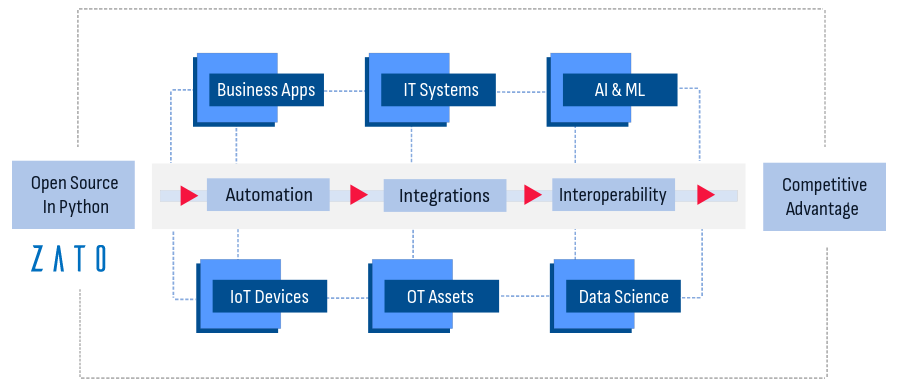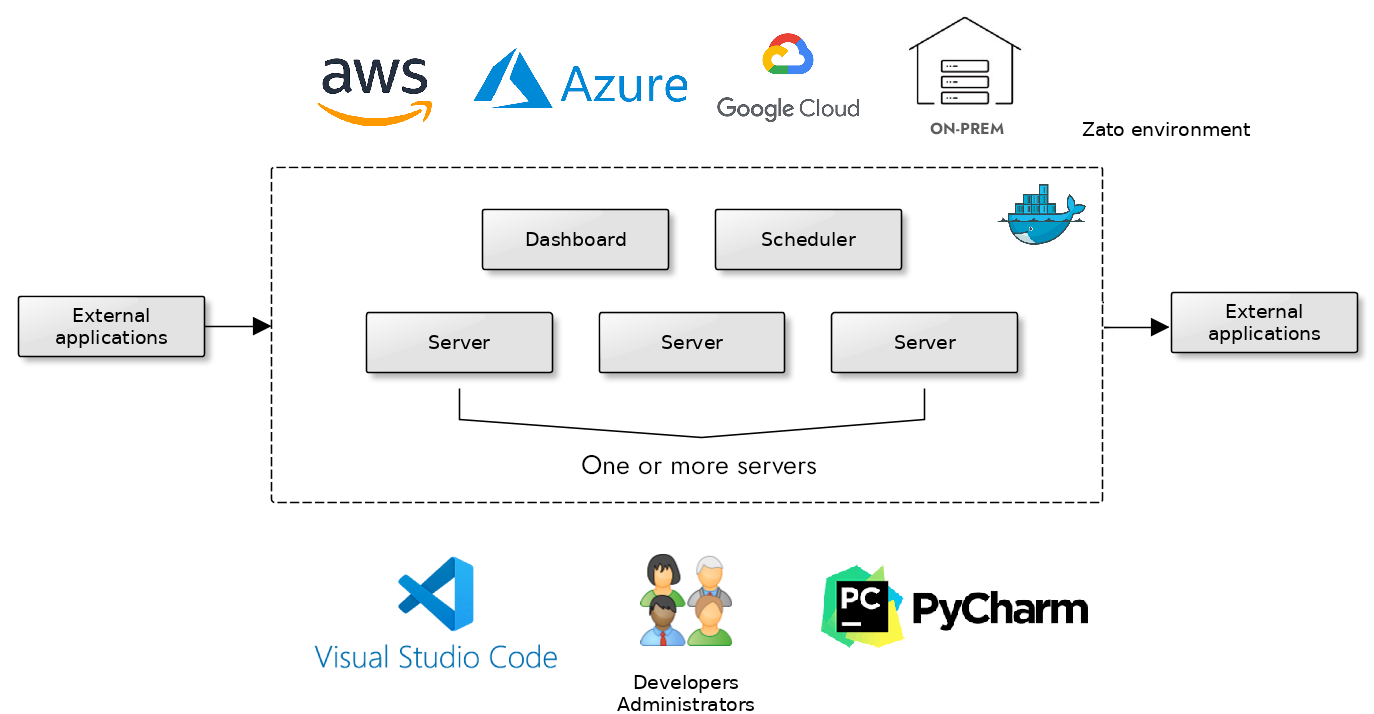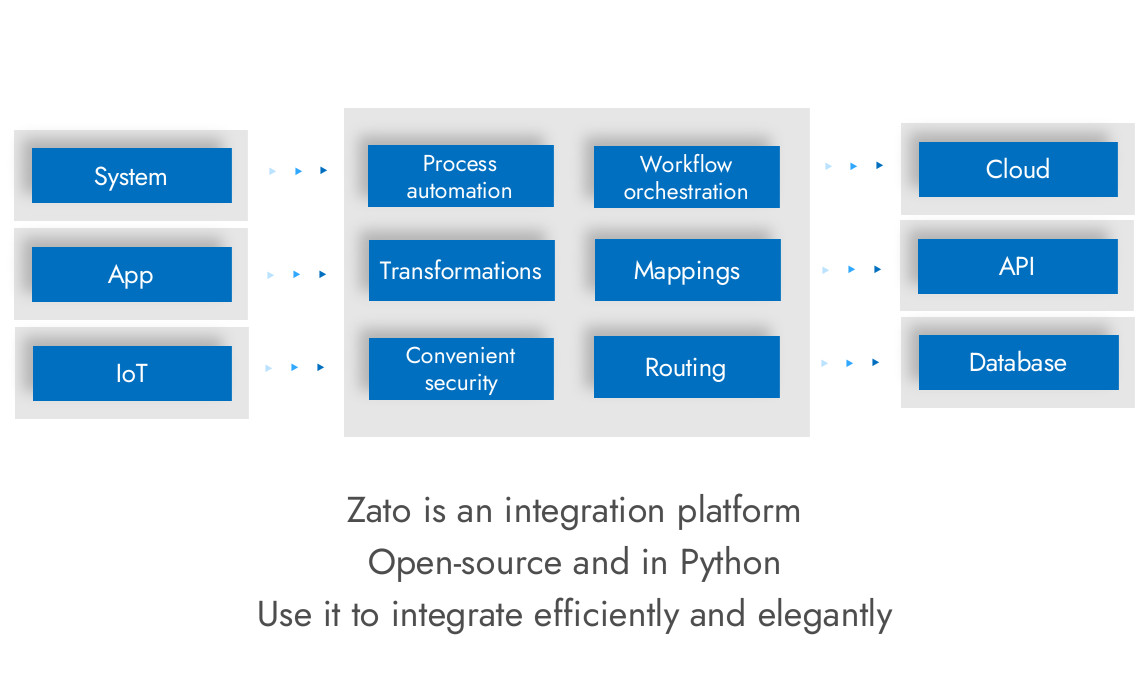Open-Source iPaaS (in Python)

As our world grows more connected by the day, seamless integration between digital systems and platforms becomes essential.
The critical question is: how can your organization ensure you're integrating these systems correctly? This challenge affects businesses of all sizes looking to streamline their operations and maximize efficiency.
Open-source iPaaS (Integration Platform as a Service) solves this problem, helping businesses streamline complex operations through flexible, innovative solutions. Unlike proprietary software, open-source iPaaS often comes with better support and greater customization options.
Whether you're an IT professional writing integration code, a developer building connected applications, or a business owner looking for operational efficiency, understanding open-source iPaaS will unlock new growth opportunities for your organization.
Key Takeaways
- An open-source platforms provides greater control and adaptability to meet unique business needs
- Developers enjoy transparency and customization options, fueling creativity and innovation
- The availability of comprehensive support guarantees long-term peace of mind
- Open-source iPaaS eliminates hefty licensing fees
Understanding iPaaS Solutions

Imagine a world where your business applications and data sources talk to each other seamlessly, without the headaches of manual data entry or clunky integrations. That's the promise of iPaaS.
An iPaaS platform connects diverse applications and data sources within an organization, making integration processes smoother than ever. By automating workflows, iPaaS streamlines business processes, freeing up time and resources for more strategic initiatives.
IT professionals, in particular, find immense value in iPaaS as it enables seamless integration across both cloud services and on-premise systems. No more juggling between different platforms or worrying about compatibility issues.
With an enterprise integration platform, the possibilities for application integration and data integration are endless. Business owners, too, appreciate the scalability and flexibility offered by iPaaS. As your business grows, so do your integration needs, and iPaaS grows right along with you.
Decision-makers, meanwhile, see iPaaS as essential for fostering innovation and digital transformation. In an era where agility and adaptability are key, having an integration platform that can keep up with changing demands is a strategic advantage.
Whether it's integrating new applications or optimizing existing processes, iPaaS solutions provide the tools needed to stay ahead in today's fast-paced business environment.
Benefits of Open-Source iPaaS and Python

Let's face it: licensing fees can burn a hole in your pocket. That's where open-source iPaaS solutions come to the rescue. By eliminating these fees, businesses can redirect resources to other critical areas.
But it's not just about cost savings. Open-source platforms offer transparency and customization capabilities that proprietary solutions often lack. Developers can dive into Python code, make tweaks, and create integrations that truly fit their organization's needs.
Business owners value the adaptability of open-source solutions. Whether it's scaling operations or integrating with new partners, open-source iPaaS provides the flexibility needed to respond to changing market dynamics.
The combination of flexibility, customization, and cost-effectiveness makes open-source iPaaS a compelling choice for organizations looking to enhance their integration capabilities.
Key features of an enterprise open-source iPaaS solution

When it comes to choosing the right iPaaS solution, understanding the key features is paramount. An open-source iPaaS solution will offer robust data mapping, data integration features, and transformation tools, allowing you to convert data formats and ensure compatibility across systems. This means you can integrate different applications without worrying about data mismatches or errors.
Users benefit from pre-built connectors for popular applications and services. These connectors simplify the integration process, reducing the time and effort required to connect various systems.
Real-time monitoring and analytics provide insights into integration performance, enabling you to identify and resolve issues before they impact operations.
Security is a top priority for any organization, and an open-source iPaaS will offer comprehensive security features. From data encryption to compliance with industry standards, your data is protected at all times. The scalable architecture of an iPaaS supports growing integration demands and complex workflows, making it a future-proof choice for businesses of all sizes.
Importance of 24x7x365 Support in iPaaS Software
Even the best open-source software won't do you much good if you can't figure out how to use it. That's why comprehensive support services are a crucial component of any iPaaS solution.
Good support enhances user experience and satisfaction, ensuring that you get the most out of your investment. From setup, through understanding the core integration capabilities, to troubleshooting, having access to expert guidance can make all the difference.
IT professionals rely on support for rapid resolution of technical issues and challenges. When things go wrong, you need a team that can provide timely assistance and effective solutions for what will be your company's integration solution.
Business owners value proactive support in maintaining uninterrupted operations. Downtime can be costly, and having a support team that's ready to step in and address issues can prevent disruptions and protect your bottom line.
Decision-makers prioritize support to maximize ROI and system efficiency. A well-supported iPaaS solution not only enhances productivity but also ensures that your integration processes run smoothly and efficiently.
Whether it's documentation, developer support, or customer services, having a robust support system in place is essential for success.
Integration capabilities of a cloud-ready open-source iPaaS

An open-source iPaaS platform is all about making integration a breeze. It facilitates seamless integrations across diverse systems, allowing you to connect cloud-based applications and legacy systems with minimal hassle. This means you can modernize your operations without leaving behind critical systems that still have value.
Developers utilize API-driven integration for flexible and dynamic workflows. This approach enables them to create custom integrations that align with specific business requirements. Business processes benefit from automated data synchronization across platforms, reducing manual work and improving accuracy.
IT teams appreciate the ability to customize integration flows to meet business needs. Whether it's creating complex workflows or integrating new applications, an open-source iPaaS platform will offers the tools and capabilities needed to get the job done. The result is a more connected, efficient, and agile organization.
Leveraging APIs in Open-Source iPaaS

REST APIs are the foundation of modern integration. They let developers build custom integrations tailored to specific requirements, unlocking new possibilities for business innovation and growth. Open-source iPaaS solutions provide extensive API libraries for diverse use cases, making it easier than ever to connect applications and services.
Organizations leverage APIs, and API management capabilities, to enhance collaboration between applications and services, breaking down silos and fostering a more connected environment. IT teams use APIs to enable real-time data exchange and process automation, improving responsiveness and efficiency.
Business owners recognize the potential of APIs to drive innovation and growth. By leveraging APIs, they can create new services, improve customer experiences, and stay ahead of the competition. In the fast-paced digital landscape, APIs are a powerful tool for staying agile and responsive.
Use Cases for Open-Source iPaaS

An open-source iPaaS solution will have a wide range of applications across multiple industries.
iPaaS for the defense industry
iPaaS is crucial in the defense industry for streamlining communication between disparate systems. It enables secure, real-time data exchange across complex networks, ensuring seamless collaboration among defense contractors, military units, and intelligence agencies. iPaaS enhances operational efficiency, data security, and decision-making capabilities.
iPaaS for airports and air travel
iPaaS in airports enhances operational efficiency by integrating systems for flight schedules, baggage handling, security, and customer service. It enables real-time data sharing among airlines, ground services, and security agencies. This integration improves passenger experience, reduces delays, and ensures smoother coordination across airport operations and services.
iPaaS for Telecommunications
In telecommunications, iPaaS enables smooth integration between various platforms and services, improving service delivery and customer experience. It helps manage data across multiple systems, simplifies backend processes, and supports scalability. With iPaaS, telecom companies can quickly adapt to changing technologies, automate workflows, and efficiently manage vast amounts of data.
iPaaS for health care
Health Care providers can connect electronic health records and billing systems seamlessly, improving patient care and administrative efficiency. In the financial services sector, iPaaS automates data exchange between CRM and accounting software, reducing errors and enhancing decision-making.
Frequently asked questions
What is an open-source integration platform (iPaaS)?
An open-source integration platform is a type of technology that allows different software applications to communicate and work together seamlessly. It enables the integration of various systems, applications, and data sources to streamline business processes.
Is Zato an iPaaS?
Yes, Zato is considered an iPaaS (Integration Platform as a Service). It is an open-source automation tool that allows users to connect different apps and services to automate workflows with little Python programming.
Is Zato open-source software that I can find on GitHub?
Yes, you have full access to the platform's source code on GitHub.
How do I get started with iPaaS in Python?
The best way is to start the API integrations tutorial or to schedule a meaningful demo with an expert that will help you become fluent in API integrations. Looking forward to hearing from you!




 — John Adams
— John Adams